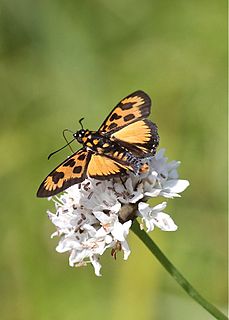 W
WAbantis bicolor, the bicoloured skipper, is a butterfly of the family Hesperiidae and the subfamily Pyrginae. Described in 1864, found in South Africa, Abantis bicolor is restricted to lowland forests from the eastern Cape to the southern coast of KwaZulu-Natal.
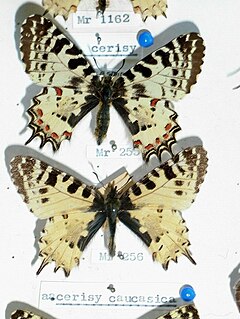 W
WAllancastria caucasica, sometimes referred to as Zerynthia caucasica, is an Old World papilionid butterfly whose geographical range extends from the Black Sea and southern Russia to Georgia and northeast Turkey. It exhibits several geographical variants. Its natural habitat is temperate forests. It is threatened by habitat loss.
 W
WAmblyscirtes hegon, the pepper-and-salt skipper, is a butterfly of the family Hesperiidae. It is found from Nova Scotia and Maine, west to southern Manitoba, south to Georgia, northern Florida and south-eastern Texas. It is mostly absent from the coastal plain.
 W
WAnthanassa ardys, the Ardys crescent, is a butterfly of the family Nymphalidae. It is found from southern Mexico, through Central America to Colombia.
 W
WBicyclus milyas, the lesser rock bush brown, is a butterfly in the family Nymphalidae. It is found in Senegal, the Gambia, Guinea-Bissau, Mali, Guinea, Burkina Faso, northern Sierra Leone, northern Ivory Coast, northern Ghana, northern Togo, northern Benin, northern Nigeria, the northern part of the Democratic Republic of the Congo, Sudan, northern Uganda, south-western Ethiopia and Kenya. The habitat consists of dry savanna.
 W
WCalleagris kobela, the Mrs Raven's flat or Mrs Raven's skipper, is a butterfly of the family Hesperiidae. It is found in South Africa, in Afromontane forests from the eastern Cape along the Amatolas and coastal forests to KwaZulu-Natal up to the midlands.
 W
WChlosyne harrisii, or Harris's checkerspot, is a member of the family Nymphalidae that is found in North America. They range from the Canadian Atlantic provinces, excluding Newfoundland and Labrador, to Manitoba and North Dakota south to West Virginia and Ohio. They can often be seen in bogs, meadows and almost anywhere else its host plant occurs. The typical elevations for this species range from 0 to 1,742 feet (531 m). It is listed as a species of special concern and believed extirpated in the US state of Connecticut.
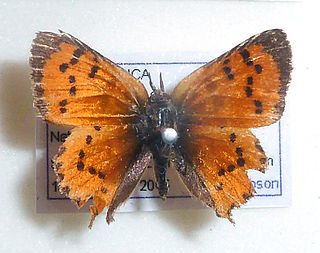 W
WChrysoritis chrysaor, the golden copper or burnished opal, is a butterfly of the family Lycaenidae. It is found in South Africa, where it is widespread in the east.
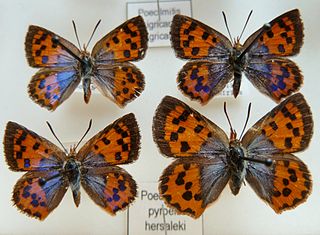 W
WChrysoritis pyroeis, the sand-dune opal, is a butterfly of the family Lycaenidae. It is found in South Africa.
 W
WDercas gobrias is a butterfly in the family Pieridae. It was described by William Chapman Hewitson in 1864. It is found in the Indomalayan realm.
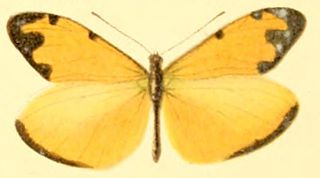 W
WEnantia albania, the costa-spotted mimic-white, is a butterfly in the family Pieridae. It is native to tropical Mexico and Central America, but rare strays have been reported from the Lower Rio Grande Valley in Texas. The habitat consists of low- to mid-elevation tropical forests and coffee plantations.
 W
WEuphaedra losinga, the dark brown forester, is a butterfly in the family Nymphalidae. It is found in Nigeria, Cameroon, Equatorial Guinea, the Republic of the Congo, the Central African Republic, Angola and the Democratic Republic of the Congo. The habitat consists of forests and secondary growth with a closed canopy.
 W
WEuphaedra luperca, the Nigerian blue forester, is a butterfly in the family Nymphalidae. It is found in southern Nigeria and western Cameroon. The habitat consists of forests.
 W
WFountainea nobilis, the noble leafwing, is a species of Neotropical butterfly belonging to the family Nymphalidae, Charaxinae subfamily.
 W
WGraphium anthedon is a butterfly of the family Papilionidae, that is found in the Sunda Islands in the Malay Archipelago.
 W
WGraphium doson, the common jay, is a black, tropical papilionid (swallowtail) butterfly with pale blue semi-transparent central wing bands that are formed by large spots. There is a marginal series of smaller spots. The underside of wings is brown with markings similar to upperside but whitish in colour. The sexes look alike. The species was first described by father and son entomologists Cajetan and Rudolf Felder.
 W
WHamadryas glauconome, the pale cracker or glaucous cracker, is a species of cracker butterfly in the family Nymphalidae. It was described by Henry Walter Bates in 1864 and is found in Mexico, Central America and south to Peru. It has been recorded as a vagrant in the United States in southern Florida, Arizona and Texas.
 W
WHamadryas guatemalena, the Guatemalan cracker or Guatemalan calico, is a butterfly of the family Nymphalidae. It is found from southern North America to central South America.
 W
WHamadryas iphthime, the ringless blue cracker or brownish cracker, is a species of cracker butterfly in the family Nymphalidae. It was first described by Henry Walter Bates in 1864. It is found in Mexico, Central America and parts of northern South America.
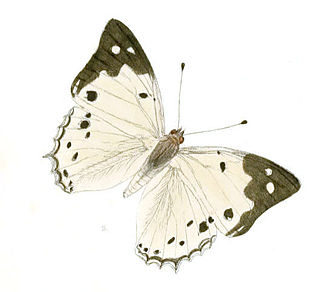 W
WHelcyra hemina, the white emperor, is a species of brush-footed butterfly found in parts of India and in Myanmar and Java.
 W
WHesperocharis graphites, the marbled white or Mexican marbled white, is a butterfly in the family Pieridae. It is found in Mexico, Guatemala and Nicaragua. It is found in montane habitats, including cloud forests, open pastures and páramo grassland.
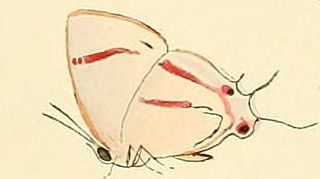 W
WIolaus sidus, the red-line sapphire or red-line sapphire blue, is a butterfly of the family Lycaenidae. It is found from South Africa to Mozambique, Zambia, Zimbabwe and then to Kenya and Uganda. In South Africa it is found from the coastal woodland in the Eastern Cape to Tongaland and Bedford, the thorn belt of KwaZulu-Natal and then to Swaziland and Mpumalanga.
 W
WJunonia artaxia, the African pansy or commodore, is a butterfly in the family Nymphalidae. It is found in eastern Angola, the Democratic Republic of the Congo Burundi, Kenya, southern and western Tanzania, Zambia, Malawi, Mozambique and Zimbabwe. The habitat consists of Brachystegia woodland.
 W
WLimenitis trivena, the Indian white admiral, is a species of nymphalid butterfly found in tropical and subtropical Asia.
 W
WLiphyra brassolis, the moth butterfly, is a butterfly found in South Asia, Southeast Asia and Australia that belongs to the lycaenid family. The larvae are predatory and feed on ant larvae. This is one of the largest species of lycaenid butterflies. Several disjunct populations across its wide distribution range are considered as subspecies. Never a common butterfly, specimens of this species are highly prized by collectors.
 W
WMicrotia is a monophyletic genus of butterflies from southern United States and Central America in the family Nymphalidae. It contains the single species Microtia elva, the elf. Larvae of this species feed on Tetramerium and other species in the family Acanthaceae.
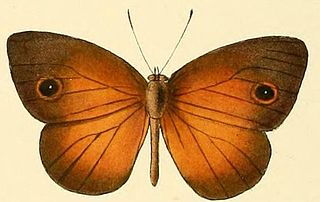 W
WMycalesis oroatis is a butterfly of the family Nymphalidae. It is found in South-east Asia.
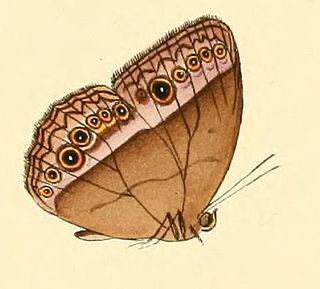 W
WMycalesis orseis, the purple bushbrown, is a butterfly of the family Nymphalidae. It is found in South-east Asia.
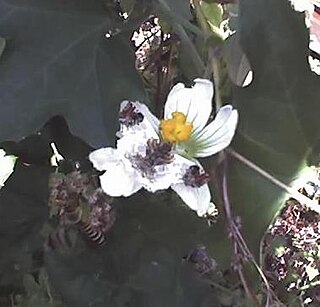 W
WNetrobalane canopus, the buff-tipped skipper, is a butterfly of the family Hesperiidae. It is found in savannah in Africa, from South Africa to Kenya to Nigeria and southern Sudan.
 W
WPachliopta phlegon is a species of butterfly from the family Papilionidae that is found in the Philippines.
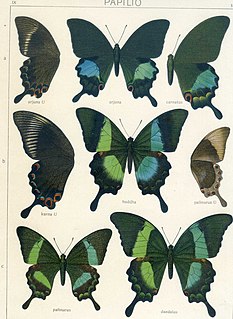 W
WPapilio karna is a species of swallowtail butterfly from the genus Papilio that is found in Java, Sumatra, Borneo and the Philippines.
 W
WPapilio sakontala is a species of swallowtail butterfly from the genus Papilio that is found in India.
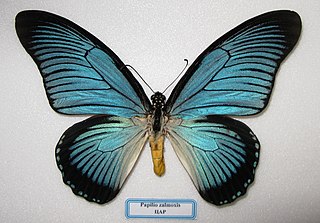 W
WPapilio zalmoxis, the giant blue swallowtail, is an African butterfly belonging to the family Papilionidae. The name of the species is given in honor of Zalmoxis – a divinity of the Getae, mentioned by Herodotus in his Histories IV, 93–96.
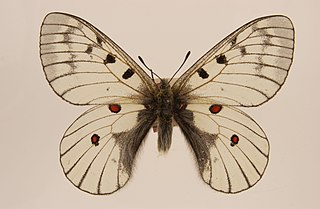 W
WParnassius bremeri is a high altitude butterfly which is found in Russia, Korea and China. It is a member of the snow Apollo genus (Parnassius) of the swallowtail family (Papilionidae). Over its vast range, the species varies widely in morphology and many subspecies have been described.
 W
WParnassius stoliczkanus, the Ladakh banded Apollo, is a rare high-altitude butterfly which is found in Central Asia. It is a member of the snow Apollo genus (Parnassius) of the swallowtail family. It is named after the naturalist and explorer Ferdinand Stoliczka.
 W
WPoanes massasoit, the mulberry wing, is a skipper butterfly found in North America.
 W
WPrecis cuama, the paler commodore, is a butterfly in the family Nymphalidae. It is found in the Democratic Republic of the Congo (Shaba), eastern and central Tanzania, Malawi, Zambia, Mozambique and Zimbabwe. The habitat consists of savanna and open woodland, especially in rocky areas.
 W
WProtesilaus telesilaus is a species of butterfly of the genus Protesilaus. It is native to the Americas.
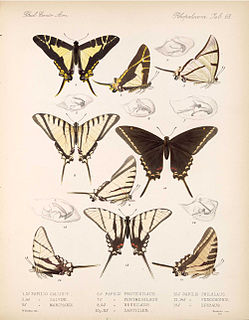 W
WProtographium calliste is a butterfly of the family Papilionidae. It is found in the Neotropical realm.
 W
WSpeyeria adiaste, the unsilvered fritillary or adiaste fritillary, is a species of butterfly of the family Nymphalidae. It is found in California north to San Mateo County and east to north Los Angeles County and Kern County.
 W
WSpeyeria coronis, the Coronis fritillary, is a butterfly of the family Nymphalidae of North America. It is common from Baja California to Washington and east to Colorado and western South Dakota and once reported in Alberta.
 W
WSpeyeria hesperis, the northwestern fritillary, is a butterfly of the family Nymphalidae. It is found in the northwestern United States and western Canada, as far east as Manitoba and the Dakotas.
 W
WStugeta bowkeri, the Bowker's sapphire, Bowker's marbled sapphire or Bowker's tailed blue, is a butterfly of the family Lycaenidae. It is found in most of southern Africa.
 W
WSymbrenthia lilaea, the peninsular jester, is a species of nymphalid butterfly found in South Asia and Southeast Asia. It forms a superspecies with Symbrenthia hippoclus. There are numerous regional forms, and the taxonomy of the group is not well resolved.
 W
WTegosa anieta, the black-bordered tegosa, is a species of butterfly in the genus Tegosa found from southern Mexico to South America.
 W
WZenonia zeno, the orange-spotted skipper, orange-spotted bellboy or common bellboy, is a butterfly of the family Hesperiidae. It is found from KwaZulu-Natal, Transvaal, Zimbabwe and Mozambique to eastern Africa and to Nigeria. The habitat consists of forests and coastal bush.
 W
WZintha is a butterfly genus in the family Lycaenidae. It is monotypic, with the only species being Zintha hintza, the blue-eyed Pierrot, blue pied Pierrot or Hintza blue. The pied Pierrots proper are the closely related genus Tuxentius, however, and like Zintha they were formerly included in Castalius.